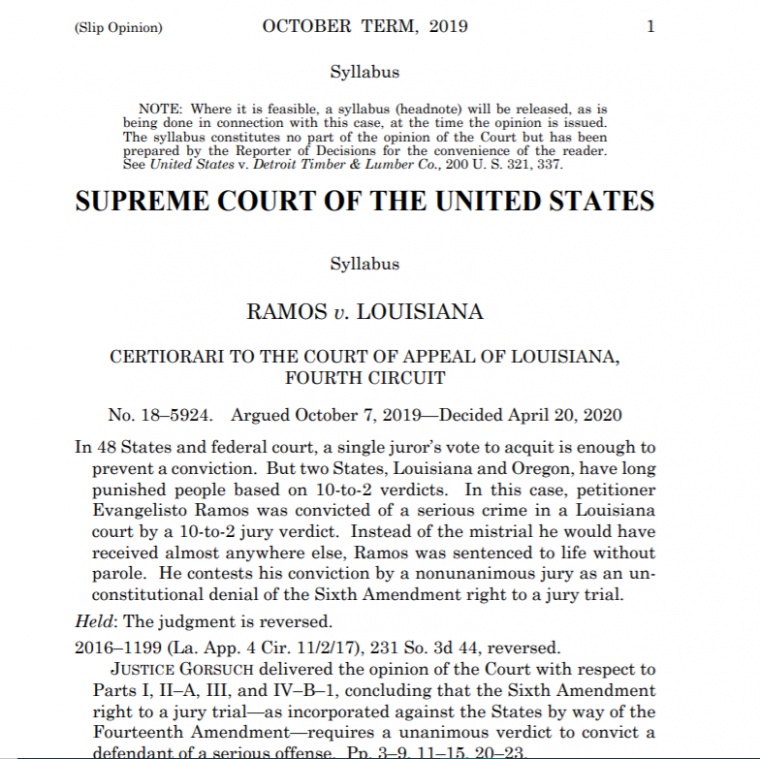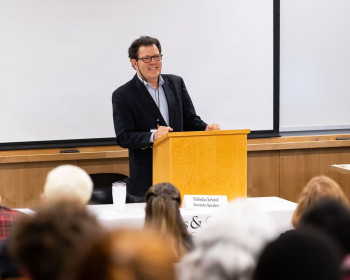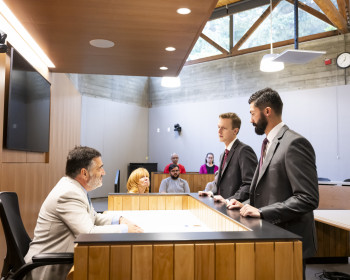Supreme Court Strikes Down Non-Unanimous Jury Convictions in Criminal Cases, Cites Professor Kaplan in Opinion
Open gallery

Aliza Kaplan, Director of the Criminal Justice Reform Clinic and Professor of Lawyering, was cited by US Supreme Court Justice Brett Kavanaugh in his concurring opinion in Ramos v. Louisiana, decided in April. In the Ramos decision, the United States Supreme Court struck down nonunanimous jury verdicts as unconstitutional.
“Oregon adopted the nonunanimous jury practice in 1934—one manifestation of the extensive 19th- and early 20th-century history of racist and anti-Semitic sentiment in that State,” Justice Kavanaugh’s opinion stated. The statement cited Kaplan’s article, co-authored with Amy Saack ’17, Overturning Apodaca v. Oregon Should Be Easy: Nonunanimous Jury Verdicts in Criminal Cases Undermine the Credibility of Our Justice System, which was published in the Oregon Law Review in 2016.
Kaplan has been dedicated to getting rid of nonunanimous juries in Oregon for many years. “Aliza Kaplan has tirelessly advocated against nonunanimous juries in Oregon,” stated John Parry, Associate Dean of Faculty. “Her scholarship and teaching on this topic have had far-reaching impacts, including being recognized by the NY Times, the Oregonian, and news outlets all over the nation.”
Clinic students, working with Professor Kaplan, have been researching the history of nonunanimous jury laws in Oregon for the past five years. In addition to the law review article, the Clinic has filed two amicus briefs with SCOTUS in different cases. CJRC filed an amicus brief in Lambert v. Louisana in 2017 and filed another amicus brief in State v. Sims in 2018. In these briefs, CJRC argued that both Oregon and Lousiana nonunanimous jury laws have their origins in discrimination and that the laws continue to apply in a discriminatory way today. The briefs argue these factors should be considered in the discussion and analysis on whether nonunanimous jury laws are constitutional or not.
Kaplan provided her expertise to the Oregon legislature several times, lobbying for such bills as HJR10 which would have given voters the option to change Oregon’s constitutional provision on nonunanimous juries. HJR10 failed to pass the Senate last year due in part because the Supreme Court took up Ramos and the legislature was waiting to see how the Supreme Court ruled.
The behind the scenes work has been instrumental in obtaining this result. Over the past five years, over ten different students have worked on this project helping with drafting op-eds, press releases, and presenting on the issues. “Students have participated in every aspect of getting rid of Oregon’s unjust and unconstitutional nonunanimous jury law–they conducted research and helped draft court briefs, articles, testimony, materials, editorials, and conducted presentations,” stated Kaplan. Also over the last four years, Kaplan and CJRC students have been working directly with colleagues in Louisiana to bring attention to this issue through legal work and through the press.
Kaplan’s work to end nonunanimous juries in Oregon was successful when Justice Gorsuch delivered the opinion of the Court. He stated that “the Sixth Amendment right to a jury trial—as incorporated against the States by way of the Fourteenth Amendment—requires a unanimous verdict to convict a defendant of a serious offense.”
Law Communications is located in room 304 of Legal Research Center (LRC) on the law Campus.
MSC: 51
email jasbury@lclark.edu
voice 503-768-6605
Cell: 626-676-7923
Assistant Dean,
Communications and External Relations, Law School
Judy Asbury
Law Communications
Lewis & Clark Law School
10101 S. Terwilliger Boulevard MSC 51
Portland OR 97219

